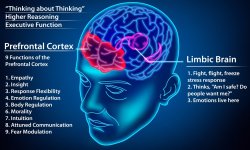You are using an out of date browser. It may not display this or other websites correctly.
You should upgrade or use an alternative browser.
You should upgrade or use an alternative browser.
The evolution of emotion
- Thread starter shiels
- Start date
luka
Well-known member
With the most nightmarish symptoms being stories like that one where normal American teenagers were filming a disabled kid drowning in a lake and laughing and jeering as they watched him die.Ignoring getting your end away for a bit, the desensitisation of personal violence is one i would say is massive
luka
Well-known member
There's something about filming everything that makes everything entertainment. Some dividing wall comes downWith the most nightmarish symptoms being stories like that one where normal American teenagers were filming a disabled kid drowning in a lake and laughing and jeering as they watched him die.
I would say third is making a related point to the one Craner was making when he was bewailing sex on the first night culture and the consequent death of the slow art of seduction and the gradual heightening of tension and desire
The thrill of the chase
Probably right in some senses but i feel with a lot of these things the societal reality isn't always the same as the narrative
For example (i know its not exclusively these that are the thrust of this argument, though they are part of it) apps doesn't necessarily increase sexual promiscuity/proliferation in as much as that it has given people a new way to create an introduction. You still have to graft once you've met someone it just means you don't necessarily have to grab someones number in a bar etc
You could argue that the anonymous nature of them means you can talk filthier than you used to be able to so sex might seem more inevitable but there were always places pre-digital that had reputations as clubs where you were more likely to find an easy route one than others, which was more often than not based in truth?
Unless it's about being nostalgic for some mythical frigid 50s era I'm not sure that argument holds much weight
With the most nightmarish symptoms being stories like that one where normal American teenagers were filming a disabled kid drowning in a lake and laughing and jeering as they watched him die.
The amount of street/gang shit knocking about like this over the years
shiels
_
There's something about filming everything that makes everything entertainment. Some dividing wall comes down
and then the contentification of every day moments leads to a certain pressure to perform, a cameraphone in your head
how does this relate to that lacanian big other idea? @suspended
Clinamenic
Binary & Tweed
I think this has to do with how insulated we are by our media of interaction, whereas before the digital revolution a greater percentage of our interactions were far less mediated by such media (note the cognation of the two terms).But the main purpose of the thread was to get under the bonnet of 'we dont have emotions anymore' - lets unpack that guys, we need a deep dive
In this more insulated situation, we can ruminate on our emotions more, which would seem to increase the potential for neuroses to develop and social anxieties to take hold, making the process of emotional connection less tractable.
Clinamenic
Binary & Tweed
Now you have to surmount additional neurotic and solipsistic hurdles if you wanna connect with someone, simply because these hurdles have more space/time opportunity to develop than before.
Last edited:
Clinamenic
Binary & Tweed
It also makes the experience of social/emotional connection more meaningful, it would seem, more of a cherished achievement.
Clinamenic
Binary & Tweed
I think this is best exemplified by the difference between real-time communication and textual communication, the latter allowing for the refinement of messages before they are received. Having the capability to refine these messages would seem to increase the social pressure of communication, and allow for social standards to be raised artificially, whereas aloofness may be more tolerated in real-time communication.I think this has to do with how insulated we are by our media of interaction, whereas before the digital revolution a greater percentage of our interactions were far less mediated by such media (note the cognation of the two terms).
In this more insulated situation, we can ruminate on our emotions more, which would seem to increase the potential for neuroses to develop and social anxieties to take hold, making the process of emotional connection less tractable.
Clinamenic
Binary & Tweed
Think about how improv comedy implicitly seems to have lower standards of funniness than written comedy. If they have time to refine the material, they are implicitly expected to deliver better material.
Clinamenic
Binary & Tweed
Also, with less time to refine the message, one has less time to intellectually build up the scaffolding.
shiels
_
Insulated is a good word here. McLuhan has that idea in understanding media. When technology extends and amplifies some parts to f the nervous system there’s always a corresponding numbing elsewhereIn this more insulated situation, we can ruminate on our emotions more, which would seem to increase the potential for neuroses to develop and social anxieties to take hold, making the process of emotional connection less tractable.
luka
Well-known member
this is why i dont like to do comissions over the internet. take away the circus trick of writing something instantly in a couple of minutes and people start getting picky. more trouble than its worth.Think about how improv comedy implicitly seems to have lower standards of funniness than written comedy. If they have time to refine the material, they are implicitly expected to deliver better material.

